人教版八年级英语上册第五单元教材全解
英语教材解读人教八年级上册unit5 Period4 Reading.

Items
Pronunciations(发音) 2 points Fluency(流利度) 2 points Interaction(互动) 2 points
The man behind him is Walt Disney
WMhicakt eisyM'sicfkierys’ts fciarsrttcoaornt:oon?
1111111111111111111111111111111111111111111111111111
His first cartoon is Steamboat Willie 10
On November 18, 11998788..
Hollywood Walk of Fame (好莱坞星光大道)
Hollywood Walk of Fame
(好莱坞星光大道)
first cartoon character
Activity 2: Read paragraph 1-3 and complete the time line.
Steamboat Willie(威利号汽船)
It was the first cartoon with sound and music
Para. 1
Can you introduce Mickey to your friends?
Name:
ID card Mickey Mouse
Age:
新人教版八年级上册英语Unit5课文重难点讲解

新人教版八年级上册英语Unit5课文重难点讲解Unit 5 Do you want to watch a game show?课文重难点讲解【教师寄语】The word 'impossible' is not in my dictionary.在我的字典里找不到「不可能」这个字。
Section A1. Do you want to watch a game show?【解析1】want =would like v 想要want a go = have a try 试一试(1) want sth 想要某物I want a pen.(2) want to do sth 想要去做某事I want to go home.(3) want sb to do sth = would like sb to do sth.想要某人做某事I really want __________________(去滑冰) today.【2014江苏盐城】69. The person who is the earliest will get what he or she _______(want).【2014苏州中考】The driver wanted___his car near the roadside but was asked by the police not to.A.ParkB. ParkedC. to parkD. parking【解析2】watch/read/see/look at “看”法不同(1)看电视、看比赛、看表演用watch; watch TV 看电视【2014重庆中考】27.—Where is your father?--He ________ the World Cup in the living room.A.is watchingB.watchesC.watchedD.will watch【2014江苏泰州】65. The TV program Super Brain(最强大脑)is so fantastic that it is well worth____ ( watch).(2)看书、看报、看杂志用read read the book看书(3)看电影、看医生用see see the doctor 看医生(4) 看黑板、看地图用look at look at the blackboard 看黑板【记】______the picture. Can you see the man in the picture? He isn’t ________ the book.He is ______TV.( ) ____ the board , child! Read the words on it after me.A. LookB. Look atC. SeeD. Watch【解析3】show ⑴v 出示,展示show sb. sth = show sth to sb. 向某人出示某物Lucy showed me her photos = Lucy showed the photos to me.show sb. around someplace 带领某人参观⑵n 演出;节目;表演be on show 正在展出fashion show 时装表演game show 游戏节目TV show 电视节目talent show才艺表演talk show 脱口秀;谈话节目sports show 体育节目( ) Zhang Xuan showed me her photos and gave me one yesterday.A. passed meB. brought meC. let me seeD. made me take【2014湖北武汉】38. I used to _______ with my wife and watchTV movies at home.A. show upB. wake upC. come upD. stay up2. —What do you think of talk show? 你认为访谈节目怎么样?—I don’t mind them . 我不介意它们。
人教版英语八年级上册Unit5单元整体说课稿
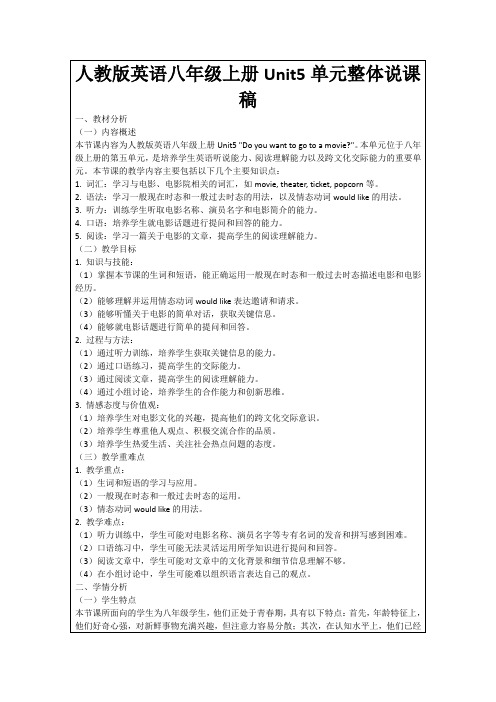
课后作业的布置旨在巩固课堂所学,拓展学生的知识面。我会布置以下作业:首先,让学生复习本节课的生词和短语,熟记一般现在时态和一般过去时态的用法;其次,让学生观看一部英语电影,并撰写一篇观后感,以提高他们的阅读和写作能力;最后,我会布置一些与电影相关的拓展阅读材料,让学生了解更多电影文化知识。作业的目的是让学生在课后继续学习和实践,提高他们的英语综合运用能力。
(三)互动方式
为了促进学生的参与和合作,我计划设计以下互动环节:小组讨论、角色扮演、提问和回答。在小组讨论中,学生将就电影话题进行交流,分享观点和经验,这有助于培养学生的合作精神和批判性思维。角色扮演活动将学生置于具体的情境中,通过模拟电影对话或采访,提高学生的口语表达能力和交际能力。提问和回答环节则鼓励学生主动提出问题,并对同学的问题进行思考和回答,这有助于激发学生的思维活跃度,增强课堂的互动性。通过这些互动方式,学生不仅能够积极参与学习,还能在合作中发现问题、解决问题,从而提高学习效果。
5.阅读:学习一篇关于电影的文章,提高学生的阅读理解能力。
(二)教学目标
1.知识与技能:
(1)掌握本节课的生词和短语,能正确运用一般现在时态和一般过去时态描述电影和电影经历。
(2)能够理解并运用情态动词would like表达邀请和请求。
(3)能够听懂关于电影的简单对话,获取关键信息。
(4)能够就电影话题进行简单的提问和回答。
人教版英语八年级上册Unit5单元整体说课稿
一、教材分析
(一)内容概述
本节课内容为人教版英语八年级上册Unit5 "Do you want to go to a movie?"。本单元位于八年级上册的第五单元,是培养学生英语听说能力、阅读理解能力以及跨文化交际能力的重要单元。本节课的教学内容主要包括以下几个主要知识点:
人教版八年级上册英语单元教案(含教材分析)--Unit 5

Unit 5Do you want to watch a game show?本单元教学内容以Do you want to watch a game show?为中心话题,围绕着“谈论喜好和制定计划”展开,学习和运用句式Do you want to watch...?和What questions and answers以及一些描述性形容词,表达对某些电视节目的喜好(评价)。
Section A是基本语言内容的收集和学习,要求学生掌握一些常见电视节目类型的英文名称,如talk show,sitcom,news,soap opera,game show,sports show,talent show等,结合do引导的一般疑问句和what引导的特殊疑问句,进行简单会话,表达个人对某种电视节目的喜好。
Section B在Section A的基础上,进一步拓展学生基础知识和语言综合运用能力。
Section B 1a在Section A 1a呈现的6种TV shows的基础上增加了comedy,action movie,scary movie等内容。
Section B的教学应侧重于引导学生拾记并运用一些描述性形容词,如wonderful,relaxing,meaningless,enjoyable,exciting,boring等,自由谈论电视节目并表达个人的喜好。
同时,Section B也安排了一些读、写的任务活动,教师在教学过程中可以整合本单元教学内容,引导学生尝试着写简单的影评。
本单元是实用且学生感兴趣的话题,本单元的学习对于提升学生具体语境下的语言综合运用能力大有助益,同时也可以丰富学生生活,陶冶情操,对学生德育教育也是益处良多。
第一课时Section A(1a-2d)Teaching Goals【教学目标】Key words:news,educational,plan,hope,discussion,stand,happen,may,expect Key phrases:talk show,soap opera,game show,sports show,talent show,find outKey sentences:1.What do you think of talk shows?I don't mind them.2.Do you plan to watch the news tonight?Teaching Key Points【教学重点】The vocabulary:news,educational,plan,hope,discussion,stand,happen,may,expect,talk/game/sports/talent show,soap opera,find outTarget language:What do you think of talk shows?I don't mind them.Do you plan to watch the news tonight?Yes. I like watching the news. I watch it every night.Because I hope to find out what's going on around the world.Teaching Difficult Points【教学难点】Use the target language to express likes and dislikes.Teaching Aids【教学工具】An English textbook,a tape recorder,CAI or courseware.Teaching Steps【教学过程】★Step 1Leading inPrepare some things and make sentences.Say,Hello,boys and girls. Nice to see you here again. Today we're going to learn Unit 5.We are going to give opinions. This is a watch. What do you think of it?Ask some students to repeat the two sentences several times.★Step 2Pre-taskPage 33,1a.1.Match work. Ask the students to read the words and the pictures,and then match the TV shows with the pictures (a-g).2.Encourage or help the students to say sth. about the pictures and do the match work.3.Line next to the words “soap opera”.(as shown below)4.Go on with the others in the same way. Then check the answers with the students.Page 33,1c.Pair-work. Ask students to practice:What do you think of...?Show the following:What do you think of sitcoms?I love/like them./I don't mind them./I can't stand them./I don't like them.★Step 3While-taskPage 33,1b.Listening.1.Ask students to read the verbs in Activity 1b and write the number from 1a.2.Play the recording for the first time. Let students just listen. Then point out the blank lines where students will write numbers from 1a.3.Play the recording a second time.4.Ask the students to listen to and read after the recording.Page 34,2a & 2b.Listening.1.Ask students to read the phrases in Activity 2a.Then ask them to listen to the conversation and write the answers on the line.2.Check the answers.3.Ask students to listen a second time. Then check the answers and let students read the sentences.★Step 4Post-taskPage 34,2c.1.Focus on the conversation in 2c.Read the instructions to the class.2.Pair-work:Ask students to read the four sentences in 2c.Ask students to practice the conversation using the TV show they know. Say,According to this conversation and using the TV shows you know,make up a conversation. I'll give you five minutes.3.Ask some pairs to practice.Page 34,2d.1.Make students scan the conversation in 2d.2.Teach and then make students role-play the conversation in pairs. In this part,student A will be Grace. Student B will be Sarah. As they talk,move around to monitor their work. Offer language or pronunciation support as needed.3.Have a group of students present their conversation to the class.★Step 5Homework1.Practice reading the conversation on Page 34.2.Do the exercises on Page 30 in students' book.Board Design板书设计Unit 5Do you want to watch a game show?The first period Section A(1a-2d)1.Key vocabulary:news,educational,plan,hope,discussion,stand,happen,may,expect,talk show,soap opera,game/sports/talent show,find out 2.Target language:A:What do you want to watch?B:What do you think of talk shows?A:They're OK.I don't mind them.B:Then let's watch a talk show.第二课时Section A(GF-3c)Teaching Goals【教学目标】Key words & phrases:joke,comedy,watch a movie/sitcom/sports show/game showKey sentences:1.Do you want to watch the news?Yes,I do./No,I don't.2.What do you think of talk shows?I don't mind them./I can't stand them!/I love watching them.3.What do you plan to watch tonight?I plan to watch Days of Our Past.Teaching Key Points【教学重点】Target language:Do you want to watch the news?Yes,I do./No,I don't. What do you think of talk shows?I don't mind them./I can't stand them!/I love watching them.Teaching Difficult Points【教学难点】Target language above.Teaching Aids【教学工具】An English textbook,CAI or courseware.Teaching Steps【教学过程】★Step 1Leading in1.Greetings.2.Check the homework by asking some students to read the sentences.★Step 2Pre-taskPage 35,Grammar Focus.Ask students to read the sentences in the grammar box and sum up the sentence structure.Say,Now read aloud the sentences in the grammar box. Then write down the sentence structure in your exercise books.★Step 3While-taskPage 35,3a & 3b.1.Ask the students to complete the blanks in Activity 3a.Say,I would like two students to finish 3a.Fill in the blanks.2.Choose a group to present the conversation.3.Ask students to look through 3b and then finish 3b.4.Choose 2 or 3 students to give their answers. The teacher asks the four questions and the students say their answers separately.★Step 4Post-taskPage 35,3c.1.Ask students to read the information in the left column. Then ask students to write the students' names. Say,Do you want to watch a movie?Fill in your opinions and find who agrees with you.2.Give the students a few minutes to prepare.3.Encourage the students to express their opinions.★Step 5Homework1.Revise the Grammar Focus.2.Do the exercises on Page 31 in students' book.Board Design板书设计Unit 5Do you want to watch a game show?The second period Section A(GF-3c)Target language:①A:Do you want to watch the news?B:Yes,I do./No,I don't.②A:What do you plan to watch tonight?B:I plan to watch Days of Our Past.③A:What do you think of talk shows?B:I don't mind them./I can't stand them!/I love watching them!第三课时Section B(1a-1d)Teaching Goals【教学目标】Key words & phrases:meaningless,action,cartoon,action movie,scary movieKey sentences:John wants to watch talk shows because they're enjoyable. I like to watch action movies because they're exciting.Teaching Key Points【教学重点】The vocabulary:meaningless,action,cartoon,action movie,scary movieTarget language:John wants to watch talk shows because they're enjoyable. I like to watch action movies because they're exciting.Teaching Difficult Points【教学难点】1.Enable the students to give opinions and talk about likes and dislikes on certain programmes.2.Help the students learn how to express opinions and tell the reasons using some description words such as educational,enjoyable,boring and so forth.Teaching Aids【教学工具】An English textbook,a tape recorder,CAI or courseware.Teaching Steps【教学过程】★Step 1Leading in1.Check the homework by asking some students to read the sentences in grammar box.2.Then show some TV shows and ask the students to give their opinions using the structure “What do you think of...?”★Step 2Pre-taskPage 36,1a.1.Show some new real things such as sunglasses,scarf,wallet,belt,watch and key ring to the students.Say,I have some fashionable things. I bought them yesterday. What do you think of my...?2.Help them to answer:I don't like it./I love it./I don't mind it./I can't stand it.3.Point to some things and ask a student:“What do you think of my new wallet?Then ask another student to point at the first one “What does he think of the wallet?”4.Ask the students to read the pictures. Ask the students to do the match work.5.Ask 1 or 2 students to give answers.★Step 3While-taskPage 36,1b & 1c.1.Ask the students to listen to the conversation.Say,Now let's listen to the tape. We are going to hear a conversation. And you have to write down the words you hear.2.Play the recorder. Then ask the students to write down the words to fill in the chart.3.Further activity:Ask the students to do some pair work in the following way if they can understand the listening material well.4.Then ask students to act out the conversation without the help of the recording.★Step 4Post-taskPage 36,1d.1.Point out the example in 1d.Ask a student to read it.2.Then encourage the students to ask and answer questions about what their parents think of the things in 1a.Say,I think you may like sports show. But I want to know what your parents think of it,please make up a conversation using the things in 1a.★Step 5Homework1.Ask students to remember the new words.2.Practice the structure:What does he/she think of your...?3.Do the exercises on Page 32 in students' book.Board Design板书设计Unit 5Do you want to watch a game show?The third period Section B(1a-1d)1.Key vocabulary:meaningless,cartoon,action movie,scary movie2.Sentences:John wants to watch talk shows because they're enjoyable. I like to watch action movies because they're exciting.第四课时Section B(2a-2e)Teaching Goals【教学目标】Key words & phrases:culture,famous,appear,become,rich,successful,might,main,reason,film,unlucky,lose,come out,be ready to,try one's bestKey sentences:1.When people say “culture”,we think of art and history.2.One of the main reasons is that Mickey was like a common man,but he always tried to face any danger.3.People today expect to see more than just a little mouse fighting bad guys,but many still know who he is.Teaching Key Points【教学重点】The vocabulary:culture,famous,appear,become,rich,successful,might,main,reason,lose,come out,be ready to,such as,think of,try one's bestTarget language:,but he always tried to face any danger. However,he was always ready to try his best. Today's cartoons are usually not so simple as little Mickey Mouse,but everyone still knows and loves him.Teaching Difficult Points【教学难点】1. Enable the students to read and write about their opinions and their likes and dislikes.2.Help the students learn how to read and write about their opinions and their likes and dislikes.Teaching Aids【教学工具】An English textbook,CAI or courseware.Teaching Steps【教学过程】★Step 1Leading inT:Do you like to watch cartoons?S:Yes,I do./No,I don't.T:What's your favorite cartoon?S:...T:Why do you like it?S:Because...★Step 2Pre-taskPage 37,2a & 2b.1.Project some cartoon animals,such as Mickey Mouse,Donald Duck,Tom and Jerry,Monkey King and so on. Ask Ss to talk about them.2.Project these new words on the screen or write them on the board and teach the new words. Ask students to repeat them. And make sure everyone knows the meanings.culture n.文化;famous adj.著名的;appear v.出现;become v.开始变得;rich adj.富有的;successful adj.获得成功的;might modal v.可能;main adj.主要的;reason n.原因;film(=movie)n.电影;unlucky adj.不幸的;lose v.失去,丢失;ready adj.愿意的;be ready to愿意迅速做某事;come out出版,发行3.Make students scan the passage first. Ask students to put a mark in contents that are unfamiliar to them. Then the teacher leads students to learn the passagesentence by sentence. Pay attention to the key words and phrases.4.Students complete the task before 2c.5.Practice reading.★Step 3While-taskPage 38,2c & 2d.1.Make students read the passage again. Say,Before reading,scan the questions in the chart of 2c.2.Students complete 2c.3.Choose 1 or 2 students to give answers.4.Check the answers.5.Pair-work. Discuss the questions in 2d with the partner. First student A asks the questions and student B answers them. Then exchange.★Step 4Post-taskPage 38,2e.1.Ask 2 or 3 students to tell the meanings of the phrases in the box of 2e.Make sure everyone knows each phrase.2.Make students write their own sentences or questions using the phrases.3.Choose 1 or 2 students to read their answers out.★Step 5Homework1.Practice reading the passage on Page 37.2.Do the exercises on Page 33 in students' book.Board Design板书设计Unit 5Do you want to watch a game show?The fourth period Section B(2a-2e)1.Key vocabulary:culture,famous,appear,become,rich,successful,might,main,reason,film,unlucky,lose,come out,be ready to,try one's best 2.Sentences:①When people say “culture”,we think of art and history.②One of the main reasons is that Mickey was like a common man,but he always tried to face any danger.第五课时Section B(3a-Self Check)Teaching Goals【教学目标】Key words & phrases:army,dress up,take sb.'s place,do a good jobKey sentences:She dresses up like a boy and takes her father's place to fight in the army.Teaching Key Points【教学重点】The vocabulary:dress up,take sb.'s place,do a good jobTarget language:She dresses up like a boy and takes her father's place to fight in the army.Teaching Difficult Points【教学难点】Write a movie review.Teaching Aids【教学工具】An English textbook,CAI or courseware.Teaching Steps【教学过程】★Step 1Leading inSay,Yesterday we talked about one famous symbol in American culture—the cartoon Mickey Mouse. Today we'll focus on a movie review about Mulan that is a household name.★Step 2Pre-taskPage 39,3a.1.Scan the words in the box.2.Fill in the blanks in the movie review.3.Check the answers together.4.Practice reading.★Step 3While-taskPage 39,3b & 3c.1.Complete the task in 3b.Write notes for your own movie review.2.Writing practice. Write your movie review using the notes in 3b.3.Choose 1 or 2 students to present the compositions.4.Correct the mistakes.★Step 4Post-taskPage 40,Part 4.Work in pairs to talk about likes and dislikes about these TV shows or movies in the chart. Follow the example:—What do you think of soap operas?—I think they're boring!Write down the description words for each one.★Step 5ExercisePage 40,Self Check.1.Students complete the tasks individually.2.Check the answers.★Step 6Homework1.Review the Grammar Focus on Page 35.2.Do the exercises on Page 34 in students' book.Board Design板书设计Unit 5Do you want to watch a game show?The fifth period Section B(3a-Self Check)1.Key vocabulary:army,dress up,take sb.'s place,do a good job2.Sentences:She dresses up like a boy and takes her father's place to fight in the army.。
八年级英语上册_第五单元课件_人教新目标版

欣然接受
婉言拒绝
Can you piay computer games with me? 你能和我一起玩电脑游戏吗? Sorry,I can’t. I have to finish my homework. 抱歉,我不能。我得先写作业。 Can you go for a walk with me? 你能和我一起去散步吗? I’m sorry I can’t. I’m writing an email to my pen friend. 对不起,我不能。我正在给我的笔友写邮件。
⒌another
⑴形容词 意为“又一的,再一的”。 搭配: 可数名词单数 another﹛ 数词﹢可数名词复数 Eg: Would you like another one?你想再来一个吗? I’ll finish the report in another ten minutes.再过十分钟我将结 束报告。 ⑵代词:“再一个;另一个” Eg: They came one after another.他们陆续来了。 C 练习: — The shoes don’t fit me. Would you please show me____? — Sure .Here you are. A. the other one B. the others C. another pair D. another one
e over顺便来访
E g : Can you come over to my house tomorrow? 你明天能顺便来我家一趟吗? Will you come over to Beijing some day? 你哪天会来北京一趟?
16.free和till
⑴free形容词 意为“空闲的;有空的”。 E g : —Are you free this evening?今晚你有空吗? —I am free after six.我6点以后有空。 拓展:free还可以意为“自由的;免费的” E g : You are free to do what you like.你愿意干什们就干什么。 The water is free here.这里的水是免费的。
人教八年级上Unit5SectionA(2d3c)说课稿

(二)新知讲授
在新知讲授阶段,我将按照以下步骤逐步呈现知识点:
1.首先,我会通过实物和图片展示本节课的词汇,如soccer ball、basketball等,并引导学生正确发音和拼写。
2.然后,我会通过情景模拟,演示如何使用一般现在时态的疑问句和回答,如“Do you have a soccer ball? Yes, I do./No, I don't.”,让学生在真实的语境中学习。
(四)总结反馈
在总结反馈阶段,我将采取以下方式引导学生自我评价并提供有效的反馈和建议:
1.学生自我评价:让学生回顾本节课的学习内容,自我评价他们在词汇、句型和语法方面的掌握情况。
2.同伴评价:鼓励学生相互评价,分享彼此的学习经验和感受。
3.教师反馈:我会对学生的学习表现进行总结,指出他们的进步和需要改进的地方,并提供具体的建议。
2.对话练习:学生两两对话,练习询问和回答关于球类运动的问题。
3.游戏竞赛:设计一个与球类运动相关的游戏,如“球类接力”,让学生在游戏中复习词汇和句型。
4.听力练习:播放一段与本节课内容相关的听力材料,让学生听后回答问题,检验他们的听力理解能力。
这些活动旨在通过互动和实践,帮助学生巩固所学知识,并提高他们的语言应用能力。
人教八年级上Unit5SectionA(2d3c)说课稿
一、教材分析
(一)内容概述
本节课为“人教版八年级上Unit5 SectionA(2d-3c)”,主题为“Do you have a soccer ball?”。本节课是Unit5的第一课时,它在整个课程体系中属于第二学期,是初中阶段英语学习的重要组成部分。主要知识点包括:
(完整word版)新人教版八年级上册Unit5英语讲义

Unit 5Do you want to watch agame show?【基】依据写出以下短,并在文中划出来。
12向⋯⋯ 学3明;弄清楚4最短的等待5目6生;7.世界各地8.打算干某事9 期盼做某事10尽某人最大努力11取代;代替12 以⋯⋯出名13 作⋯⋯出名14 快速做某事15 干得好16 在影中17 中央台18 情形喜19 人与自然2021 体育新22 天气23 肥皂24忍耐做⋯⋯25拟订一个划26从⋯⋯ 学到27一天;有朝一日28存心的29毫无心的30恐惧影31作影32行33第一版34努力去面35不如36教育的37刚巧做某事38出色的39快乐的40放松的41令人的42无聊的43风趣的44忘做某事45有名的志46在美国文化中4780 多年前48在 20 世 30 年月49准做某事50有多困51在 1900 年 11 月 14 日52此中一个主要的原由53比方【法点睛】某人某事的见解及价常用句句型:1.What do/does +主+ think of... ? How do you like...? ⋯⋯⋯⋯怎么?What do you think of comedies?你喜怎么?What does Sue think of the TV show?个目怎么?2.What/How about... ?⋯⋯怎么?What about the book?本怎么?常用答:(1)能够用 like ,love,can't stand, don't mind 组成以下句子:I like/love it. 我喜它。
I don't mind it. 我不介怀它。
I don't like it. 我不喜它。
I can't stand it.我不可以忍耐它。
(2)也能够用形容 interesting,boring 等及表示程度的副 very much,a lot, a little 等往返答。
人教版英语八年级上册Unit5 SectionB 教材知识详解

Unit 5Do you want to watch a game show?Section B & Self CheckSection B 2bWhen people say “culture”, we think of art and history.①But one very famous symbol in American culture is a cartoon. We all know and love the black mouse with two large round ears—Mickey Mouse.②Over 80 years ago, he first appeared in the cartoon Steamboat Willie.③When this cartoon came out in New York on November 18,1928, it was the first cartoon with sound and music. The man behind Mickey was Walt Disney.④He became very rich and successful. In the 1930s, he made 87 cartoons with Mickey.Some people might ask how this cartoon animal became so popular. One of the main reasons is that Mickey was like a common man, but he always tried to face any danger.⑤In his early films, Mickey was unlucky and had many problems such as losing his house or girlfriend, Minnie.⑥However, he was always ready to try his best. People went to the cinema to see the “little man” win. Most of them wanted to be like Mickey.On November 18, 1978, Mickey became the first cartoon character to have a star on the Hollywood Walk of Fame. People today expect to see more than just a little mouse fighting bad guys, but many still know who he is. Who has a pair of ears more famous than Mickey's?当人们说“文化”时,我们会想到艺术和历史。
人教版英语八年级上册Unit5Doyouwanttowatchagameshow教材全解

人教版英语八年级上册Unit 5 Do you want to watch a game show?教材全解【教材内容解析】Section A1.What do you think of talk shows? (P. 33)show用作可数名词,意为“节目”,talk show表示“访谈节目”。
He is a talk show host.What’s your favourite TV show?【拓展】show用作名词,还可以表示“展览、表演”,on show表示“在展览中”,另外,show还可以用作及物动词,表示“给……看、展示”。
Some famous paintings are on show now.Can you show your new phone to me?2.I don’t mind them. (P. 33)① mind doing sth. 介意做某事Would you mind opening the window please?② mind sb’s/sb doing sth. 介意某人做某事Do you mind my/me calling you at night?3.news (P. 33)news用作不可数名词,表示“新闻”,a piece of news表示“一则新闻”,news在句中作主语时,谓语动词用单数形式。
The news makes the children excited.No news is good news.4.can’t stand (P. 33)stand此处用作及物动词,表示“忍受”,用于否定句和疑问句中,can’t/couldn’t stand doing sth.“不能忍受做某事”。
I can't stand the bad weather.He can’t stand living here any longer.5.Then let’s watch a talk show. (P. 33)(1) let作使役动词,意为“允许、让”,let sb. (not) do sth.“让某人做某事”。
Unit 5重要知识点讲解2021-2022学年人教版八年级英语上册
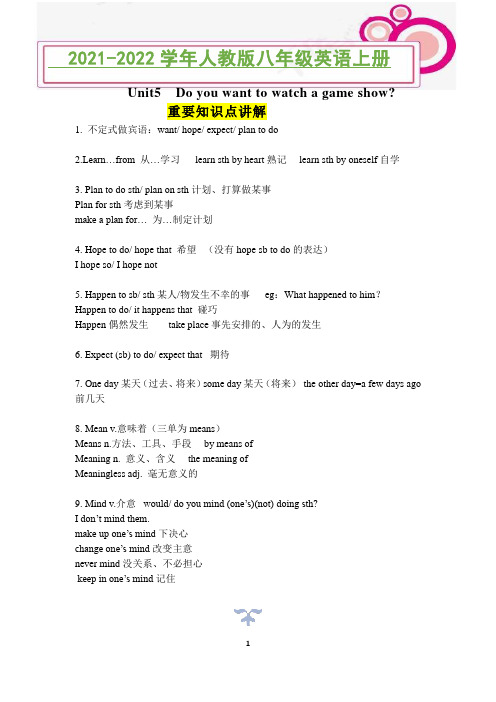
Unit5Do you want to watch a game show?重要知识点讲解1. 不定式做宾语:want/ hope/ expect/ plan to do2.Learn…from 从…学习 learn sth by heart熟记learn sth by oneself自学3. Plan to do sth/ plan on sth计划、打算做某事Plan for sth考虑到某事make a plan for… 为…制定计划4. Hope to do/ hope that 希望(没有hope sb to do的表达)I hope so/ I hope not5. Happen to sb/ sth某人/物发生不幸的事 eg:What happened to him?Happen to do/ it happens that 碰巧Happen偶然发生take place事先安排的、人为的发生6. Expect (sb) to do/ expect that 期待7. One day某天(过去、将来)some day某天(将来)the other day=a few days ago 前几天8. Mean v.意味着(三单为means)Means n.方法、工具、手段by means ofMeaning n. 意义、含义the meaning ofMeaningless adj. 毫无意义的9. Mind v.介意would/ do you mind (one’s)(not) doing sth?I don’t mind them.make up one’s min d下决心change one’s mind改变主意never mind没关系、不必担心keep in one’s mind记住10,think of认为、想起think about认为、考虑think over仔细考虑11,be famous for因为…而著名be famous as作为…而著名12,appear v.出现(→disappear消失)appearance n. 出现、露面、外表13,come out出版、发表,出来,开花14,succeed v.成功 succeed in (doing) sth成功地做某事Success n.成功Successful adj.成功的be successful in (doing) sth成功地做某事Successfully adv.成功地15,reason结论性原因cause起因 excuse借口16,danger n.危险be in great danger处于极大危险中out of danger脱离危险endanger v. 使遭遇危险,危及dangerous adj. 危险的endangered adj.有灭绝危险的17,luck n.运气—lucky adj.幸运的(→unlucky不幸的)—luckily adv. 幸运地18,be ready to do sth愿意做某事get ready to do sth准备去做某事get ready for为…做准备19,a pair of+ n复数做主语,谓语动词用单数eg:A pair of glasses is enough for me.20,Take one’s place to do sth代替某人做某事21,do a good job干得好22,wear 表状态,接服装、手套、眼镜、香水等put on 表动作,接服装(→take off)dress 表动作,接sb/ oneselfget dressed穿衣dress up盛装打扮try on试穿(动副结构)try it on(be) in+颜色或衣服eg:The girl in a red coat is my sister.词语辨析1.the other, the others, other, others,another 辨析the other 表示特指两个或者两部份中的另一个或另一部分,可直接单数名词或复数名词。
人教版八年级英语上册第五单元教材全解
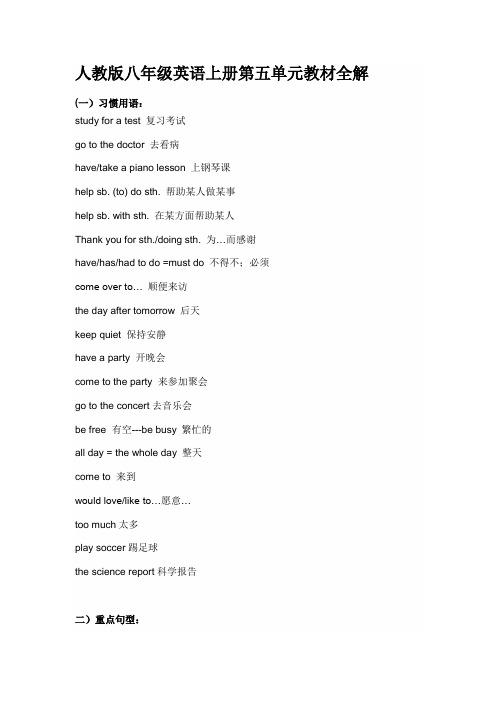
人教版八年级英语上册第五单元教材全解(一)习惯用语:study for a test 复习考试go to the doctor 去看病have/take a piano lesson 上钢琴课help sb. (to) do sth. 帮助某人做某事help sb. with sth. 在某方面帮助某人Thank you for sth./doing sth. 为…而感谢have/has/had to do =must do 不得不;必须come over to… 顺便来访the day after tomorrow 后天keep quiet 保持安静have a party 开晚会come to the party 来参加聚会go to the concert去音乐会be free 有空---be busy 繁忙的all day = the whole day 整天come to 来到would love/like to…愿意…too much太多play soccer踢足球the science report科学报告二)重点句型:1.Can you come to my party on Wednesday? 你星期三能来参加我的晚会吗? 2.Sorry.I can't.I have a piano lesson. 对不起,我不能。
我要上钢琴课。
3.Sure.I'd love to.当然,我愿意。
4.I'm playing soccer.我在踢足球。
5.I have too much homework(to do) this weekend .这个周末我有太多家庭作业(要做)。
6.I have to go to the doctor.我得去看医生。
7.I can't join you because I have to help my mom.我不能参加,因为我要帮我妈妈干活。
八年级上册英语第五单元解析

人教版新目标八年级英语上册第五单元知识详解【重要词组】◆baseball game棒球比赛◆the day after tomorrow后天◆come over to从一地方来到另一个地方,过来◆go to the doctor去看病◆have a piano lesson上钢琴课◆have to不得不◆text time下一次◆study for a test准备考试◆be free有空儿,有时间【部分词汇用法】1.做功课:do my lessons2. have a lesson / have lessons(学生)上课:3. give a lesson to sb. / give lessons to sb.(老师)给某人上课:或) give sb. a lesson给某人一个教训:1. from one to another从一个到另一个:I’m going hiking fro m one city to another.One after another 一个接一个I love apples, so I eat one after another when there are some at home.other/ others/another/the other/the othersanother作代词(单数),泛指三个以上不定数目的人或事物中的另一个the other作代词(单数),表示两者中的另一个人或事物I have two pens. One is red and the other is black.the others作代词(复数),表示全体中除去一部分后其余所有的人后事物20 students in our class are English and the others are Chinese.thank you for / thanks forthank you for谢谢你… 后面跟谢谢你… 后面跟doing sth.1. all 与whole(1). all与whole 都可用在表示整体的单数名词前,但限定词的位置不同。
人教英语八年级上册第五单元知识点归纳.docx

八年 上册Unit 5 Do you want to watch a game show?一. 的( adj. )新的 →( n. )news 新 2. lose →lost (vt.) 失 (adj. )教育的,有教育意 的→( vt. )educate 教育 →( n. ) education 4. successful (adj.) 成功的→( vt. )succeed 成功→( n. )success 成功 (adj.) 不幸的,倒霉的→( adj. ) lucky 幸运的→( n. )luck 运气6. lose →lost (vt.) 失教育二.短 of 2. learn from 从⋯⋯ 得;向⋯⋯学 out 明;弄清楚 4. talk show 目 show 游 目 opera 肥皂 on 生 8. watch a movie 看 影 pair of 一双;一 one ’s best 尽某人最大努力 famous as 与⋯⋯一 有名 12. have a discussion about 就⋯⋯ day 有一天 as 例如 up sb. ’s place 代替;替 a good job 干得好 enjoyable information 有趣的 料 of ⋯⋯之一 like the world 全世界 symbol o f ⋯⋯的象征打扮;梳理令人愉快的 西看起来像三.用法集萃 sb. do sth. 某人做某事 to do sth. 希望做某事 to do sth. 盼望做某事ready to do sth. 于做某事 2. plan to do sth.划 / 打算做某事happen + 、地点 某地、某事 生了某事about doing ⋯?做⋯⋯怎么 ?8. try one ’s best to do sth. 尽力做某事我不介意它 。
mind 此 用作及物 ,意 “介意,反 ”,通常用于疑 句,否定句或条件句中,其后可接名 ,代 或 -ing 形式 。
最全面人教版八年级上册英语第五单元知识点归纳总结
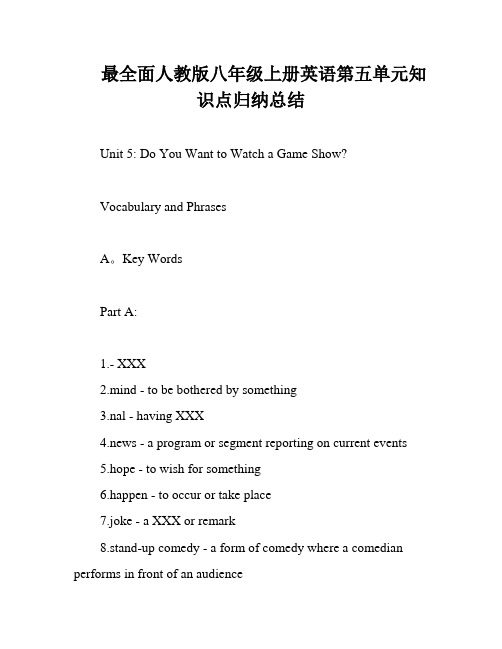
最全面人教版八年级上册英语第五单元知识点归纳总结Unit 5: Do You Want to Watch a Game Show?Vocabulary and PhrasesA。
Key WordsPart A:1.- XXX2.mind - to be bothered by something3.nal - having XXX4.news - a program or segment reporting on current events5.hope - to wish for something6.happen - to occur or take place7.joke - a XXX or remark8.stand-up comedy - a form of comedy where a comedian performs in front of an audience9.cartoon - an animated film or TV show10.famous - well-known or XXX11.e - to start to be or come to be12.successful - XXX13.main - most XXX significantmon - XXX15.unlucky - having bad XXX16.ready - XXX do something17.simple - easy to do or understand18.culture - the customs。
beliefs。
and practices of a particular group or society19.appear - to come into sight or e visible20.rich - having a lot of money or nsPart B:1.meaningless - having no XXX significance2.n - something done or XXX3.n - the act of XXX4.stand - to XXX or endure something5.plan - to intend or decide to do somethingedy - a XXX7.e popular - XXX-XXX8.dress up - to wear special XXX9.do a good job - to perform well or successfullyB。
人教版八年级上学期英语unit5单元课件全套

some great jokes
game shows
soap operas
tonui. What are you watching? Lin Hui: Hey, Sally. I’m watching a really funny sitcom. Sally: Oh, I don’t like sitcoms. What can you expect to learn from them? I like to watch the news or talk shows.
A: Do you plan to watch the news tonight?B: Yes. I like watching the news. I watch it every night.A: Why?B: Because I hope to find out what’s going on around the world.
What do you want to watch?
What do you think of talk shows?
They’re OK. I don’t mind them.
Then let’s watch a talk show.
What do you want to watch?
What do you think of sports shows?
Lin Hui: Watching sitcoms is a great way to relax! You can learn some great jokes, too.
Tapescripts:
Sally: Well, I like shows that are more educational. I think even game shows are better than sitcoms. You can try to guess the answers to the questions. Lin Hui: Then what do you think of soap operas? Sally: Oh, umm, well, I know you can’t expect to learn much from soap operas, but I have to say I love watching them! I plan to watch Days of Our Past tonight.
Unit 5(单元解读课件)八年级英语上册(人教版)
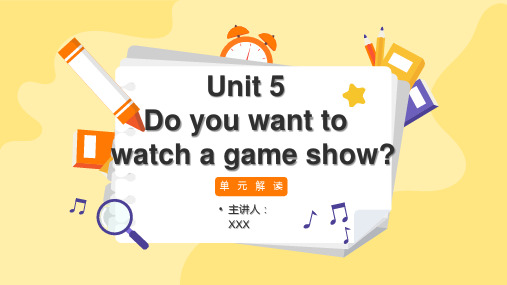
单元目标语言,在语言功能上可分为谈论计 学 生 学 习 语 句型:
法。
划、谈论对某种电视节目的看法、询问及说 法 提 供 一 个 —Do you want to 2.理解和表达
明原因和深入谈论电视节目;
很 好 的 语 境 ,watch...?
对不同类型的
让 学 生 在 对 —Yes, I do. / No, I 电视节目的看
中把握文字传递的感情色彩,如love, like,don’t mind等;能
够在阅读中把握信息呈现的时间线索
学习能力
通过谈论对于影视节目的看法与偏好和制定计划,激发对英
语语言学习的兴趣;通过听、说、读、看、写等各项技能策
略的感悟、体验和学习,形成良好的学习习惯,提高学习效
2
率。能够合理、有效地利用多媒体等现代技术搜集学习资料;
好的句式。
节目的喜好和看
法,并在交流的
2a-2b的听力对话更加深入,主人公在 过程中学会接纳
表达自己的观点时陈述了喜好某种电 不同的观点并尊
视节目的原因,其中还呈现了不定式 重他人。
作宾语的句式
词汇:
正确使用相
sitcom , news , mind ,关名称词汇、
stand,educational, 表达喜好的
能够有意识地训练自己的英语思维,努力做到善学、乐学
思维品质
通过听说读看写等训练,能够准确获取有关对于影视节目
的看法与偏好和计划制定等方面的信息,学会与人探讨、
交流、比较人物之间的相同点与不同点,在此基础上联系
3
自身实际,有逻辑、辩证地、创新性地表达个人看法,实
现知识与思维能力的迁移
文化意识
能够根据自身兴趣爱好和需要选择合适的电视节目,促进
人教版八年级英语上册Unit5知识点讲解

人教版八年级英语上册Unit5知识点讲解Do you want to watch a game show?Section A Page 331. news 表“新闻”,是不可数名词,形复实单。
a piece of news 一则消息There _______ some good news in today’s newspaper.2. soap opera肥皂剧;talk show脱口秀节目;game show 游戏节目;sports show 体育节目;talent show 才艺节目3.名词修饰名词:第一个名词相当于形容词,所以第一个名词常用单数形式。
但如果第一个名词表性别时,man和woman要与第二个名词的单复数形式一致;sport总是用复数形式修饰第二个名词。
① a book store ----two _______ stores;② a man teacher---- two _______ teachers;③ a ________ shirt ---- two ________ shirts (运动衫)4. mind doing sth. 介意做某事Would you mind __________ ( close ) the door?请你把门关上,好吗?5. stand ( stood )除了表“站立”,还有“忍受”的意思。
常考短语有:can’t stand doing sth.无法忍受做某事(常指痛苦的事),类似短语还有:can’t help doing sth.禁不住做某事(控制不住自己);can’t wait to do sth. 迫不及待地去做某事(做某事不能等)① I can’t stand _________ (wait) for you on the street.② The movie was so funny that I couldn’t help ___________ (laugh).③ I can’t wait _______ ( go ) camping by the lake.6. 问对方对某事的看法,常用:What do you think of ….? = How do you like….? 回答常用:I don’t mind them.我不介意它们;I can’t stan d them.我无法忍受它们;I love them7. plan to do sth. 计划去做某事I plan __________ ( watch ) TV tonight.Section A Page 341. educational形容词,有教育意义的;education名词,教育I want to get a good _________. The movie is _____________.2. plan(计划)、expect(期待)、hope(希望)、want(想)后都可以直接接动词不定式作宾语,即:①She plans _________ (watch) the movie.②You can expect __________( learn ) a lot from them.③I hope ___________ (visit ) Beijing some day.【注意】expect, want 后还可以接双宾语,即:expect / want sb to do sth. 但hope 后不能接双宾语。
英语教材解读人教八年级上册5 Section A 2d
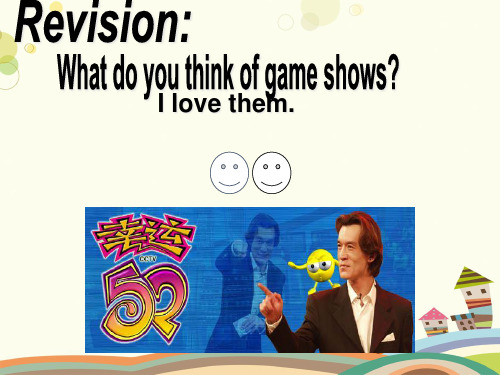
than sitcoms. 7.I hope ___to__b_e____(be) a TV reporter one day. 8.What ___d__id___you_____d_o____(do) in class today? 9.Lin hui thinks she can learn some great ________jo(jkoekes)
around the world
Learning aims:
1. To master key words: discussion, happen, expect 2. To role play 2d. 3. Learn to make plans to watch TV.
Don’t spend too much time on TV.
A. on
B. to
C. of
D. for
3. I can't stand ___C_____ TV for a long time.
A. to watch
B. watch
C. watching
D. watched
4. He hopes __C__ an actor in the future.
A. to is
3.What are Sarah’s favorite TV shows? Why does she like them? Her favorite TV shows are the news and talk shows. Because she can learn a lot from them and she wants to be a TV reporter one day.
- 1、下载文档前请自行甄别文档内容的完整性,平台不提供额外的编辑、内容补充、找答案等附加服务。
- 2、"仅部分预览"的文档,不可在线预览部分如存在完整性等问题,可反馈申请退款(可完整预览的文档不适用该条件!)。
- 3、如文档侵犯您的权益,请联系客服反馈,我们会尽快为您处理(人工客服工作时间:9:00-18:30)。
人教版八年级英语上册第五单元教材全解(一)习惯用语:study for a test 复习考试go to the doctor 去看病have/take a piano lesson 上钢琴课help sb. (to) do sth. 帮助某人做某事help sb. with sth. 在某方面帮助某人Thank you for sth./doing sth. 为…而感谢have/has/had to do =must do 不得不;必须come over to… 顺便来访the day after tomorrow 后天keep quiet 保持安静have a party 开晚会come to the party 来参加聚会go to the concert去音乐会be free 有空---be busy 繁忙的all day = the whole day 整天come to 来到would love/like to…愿意…too much太多play soccer踢足球the science report科学报告二)重点句型:1.Can you come to my party on Wednesday? 你星期三能来参加我的晚会吗? 2.Sorry.I can't.I have a piano lesson. 对不起,我不能。
我要上钢琴课。
3.Sure.I'd love to.当然,我愿意。
4.I'm playing soccer.我在踢足球。
5.I have too much homework(to do) this weekend .这个周末我有太多家庭作业(要做)。
6.I have to go to the doctor.我得去看医生。
7.I can't join you because I have to help my mom.我不能参加,因为我要帮我妈妈干活。
8.I'm having a piano lesson the day after tomorrow.后天我要上钢琴课。
9.Can you come over to my house to discuss the science report.你能来我家讨论这份科学报告吗?三)交际用语:Can you come to my birthday party?Yes,I'd love to./Sorry,Ican't.I have to study for a test.I'm sorry. I'm playing soccer on Saturday.When is the party? It's at seven thirty.四)主题写作:情境:你朋友邀请你去干某事,你有事不能去,写信拒绝并说明理由.词语点击:1.lesson: ['lesn]名词n. [C]①功课;课业Lessons begin at 8:00. 八点钟开始上课。
②课程[P1][(+in/on)]She gives the children lessons in music.她给孩子们上音乐课。
③一节课;(教科书中的)一课They usually have four lessons in the morning.上午他们通常有四堂课。
④教训,训诫The young man has learned his lesson and won't drive under the influence again. 小伙子已得到了教训,再也不敢酒后开车了。
及物动词vt. 教训,训斥I'll lesson you, ! 我要教训你!【积累】与lesson有关的短语:have a…lesson上一节……课,give sb. a lesson 给某人上课,do one's lesson做功课,teach sb. a lesson给某人一个教训【辨析】同义词lesson与class的区别(一)class与lesson在着重指教学内容“课时”时,可互换使用We have four English classes/lessons every week.每周我们上四节英语课。
There are no classes/lessons on Sunday.星期天没有课。
(二)表示班级、同学们、开始上课、课堂、课堂活动时只能用classThere are fifteen classes in our school.我们学校有15个班级。
Good morning,Class!同学们,早上好。
Class begin at 9:00 in the morning.上午9点开始上课。
Don't talk in class.课堂上不要讲话。
(类似短语:after class课后;out of class课外;)(三)表示课、第几课、学科、科目、功课时只能用lesson.Please read the first lesson.请读第一课。
There are 120 lessons in Book One.第一册书有120课。
We study Chinese,Maths,English and other lessons.我们学习语文、数学、英语和其它一些学科。
I can help you with your lessons.我能帮你学习功课。
The girl is doing her lessons.这个女孩正在做她的功课。
2.sure: [?u?]形容词adj. ①确信的,有把握的[+(that)][+wh-][(+about/of)]I'm not sure whether our team will win. 我不能肯定我队是否能赢。
We are sure of his honesty. 我们确信他是诚实的。
②一定的,必定的[+to-v]She is sure to write to you. 她一定会给你写信的。
③确实的;可靠的One thing is sure, he won't let you down.有一点是确定的,那就是他不会让你失望。
Exercise is a sure way of losing weight. 运动是减肥的可靠办法。
副词adv.【美】【口】的确;一定;当然It's sure cold outside. 外面实在很冷。
【积累】be sure to do sth.一定、务必做某事;be sure +that从句,(例如:I'm sure that the weather will change soon.我有把握说天气马上会变的。
);Make sure+that从句“务必,确信……”。
3.another: [?'n???]形容词adj. ①又一,再一He drank another glass of beer.他又喝了一杯啤酒。
②另一;另外的That's another matter.那是另外一回事。
代词pron.①又一个,再一个The little boy finished his cake and asked for another. 小男孩吃完自己的饼后,要求再吃一块。
②另一个 I don't like this one, please show me another.我不喜欢这个,请给我另一个【注意】another+数目+名词=数目+more+名词,表示“额外……,再,又……”例如:another two hours= two more hours再加两个小时4.whom: [hu:m]pron.(who的宾格)在句中做宾语。
I only confide in those whom I can trust. 我仅信赖我能相信的人。
【注意】在介词后必须用whom;whom放在句首可用who来代替。
例如:With whom did you go hiking yesterday?你昨天和谁一起出行的?Whom /Who will you ask for help?你将向谁求助?5.join: [d??in]1)及物动词vt. ①连结;使结合[(+to/together/up)]He joined the two pieces of wood together with glue.他用胶水将这两块木料粘在一起。
②和...一起做同样的事;和...作伴[(+in/for)]Will you join us for dinner?你和我们一起吃晚饭好吗?参加;作...的成员I'll advise him to join our club. 我将建议他加入我们的俱乐部。
2)不及物动词vi. ①会合;相遇Where do the two rivers join?这两条河在什么地方会合?②邻接The two estates join at the foot of the hill.这两处房地产在山脚下相毗连。
3)名词n. 接合点;接连处[C]The joins can hardly be seen.接缝几乎看不出来。
【辨析】take part in 与join的区别:①take part in 意为“参加,参与(某事物或某活动)比如说参加运动会。
例如: How many countries will take part in the World Cup?有多少个国家要参加世界杯?②join意为“参加(某组织),加入(某处任职),参加到某个人群中去,从而成为其中一员”。
例如:She joined a health club. 她参加了一个健身俱乐部。
6.invitation: [,invi'tei??n] 名词n. [(+to)][+to-v] 邀请, 请帖;其后长接介词to表示“对……的邀请”。
例如:She received an invitation to the party.她接到参加聚会的邀请。
They sent out 200 invitations to their wedding.他们发出了两百张婚礼请帖。
Invite是invitation的名词形式,常构成“invite sb. to do sth.”表示“邀请某人做某事”。
例如:He invited several of his friends to the show.他邀请了几个朋友去看表演。
7.training:['treini?]名词n.训练;锻炼,培养[(+in/for)]She was given some quick training at the vocational school.她在职业学校受过速成训练。
